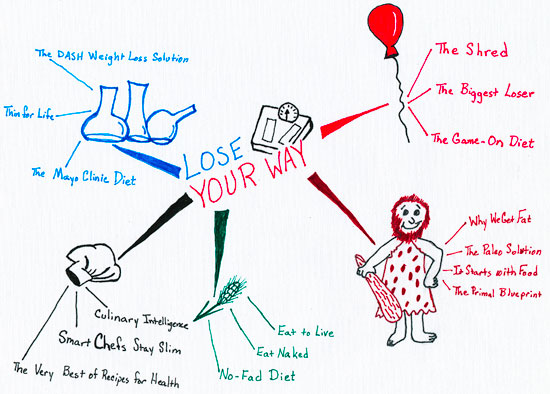
March is National Nutrition Month® , as declared by the Academy of Nutrition and Dietetics. The 2013 theme is "Eat Right, Your Way, Every Day." While we hear a lot on the news about childhood obesity, the most recent findings of the CDC's National Center for Health Statistics indicate that the age groups with the highest rates of obesity are 40 to 60 and over 60. As older adults, we have long-established tastes and habits surrounding food. The nation's registered dieticians want to remind us that healthy eating can be personalized to our lifestyles.
If your interest in nutrition is to lose weight, you will find a vast array of books on the library shelves that offer potential solutions. To help you negotiate the many options in food plans, I selected books in five broad categories to aid in discovering your way to eat right every day.

Make it a party. Lots of people like to share their dieting adventures with others. You can hop on one of the hottest trends in dieting with The Shred Revolutionary Diet by Ian K. Smith, which has been near the top of bestseller lists since its release in December. If TV's your thing, there's still time to join The Biggest Loser bandwagon before the end of the current season supported by books like The Biggest Loser: 6 weeks to a healthier you by Cheryl Forberg and others. Or, you could pull together friends, families, and coworkers for your own weight loss contest using the rules in The Game-On Diet by Krista Vernoff and Az Ferguson.
Eat like a caveman. Some currently popular books argue that our bodies haven't changed that much since before humans developed agriculture so perhaps we are better off eating more like our prehistoric ancestors. Gary Taubes makes the case in Why We Get Fat. Several books provide plans, recipes, and advice for this high-protein, low-carbohydrate diet: The Paleo Solution by Robb Wolf, It Starts with Food by Dallas & Melissa Hartwig, and The Primal Blueprint by Mark Sisson.
Eat a plant-based diet. Another crop of books takes an almost polar opposite approach, emphasizing vegetables, fruits, and whole grains. These diets include raw foods, all types of vegetarian diets, and flexitarian plans that allow for a little meat. Besides advocating good health for individuals, these books also tout the environmental benefits of eating lower on the food chain. Books in this category include Eat to Live by Joel Fuhrman, Eat Naked by Margaret Floyd, and No-Fad Diet by the American Heart Association.
Cook your way to health. To eat "your way" might mean cooking more of your own food. Culinary Intelligence by Peter Kaminsky advocates focusing on the concept of Flavor per Calorie so that you can enjoy food more while consuming less of it. Smart Chefs Stay Slim by Allison Adato offers many tips by chefs who eat well while being surrounded by food all day. The Very Best of Recipes for Health by Martha Rose Shulman features 250 reader-tested recipes from the health section of the New York Times website.
Follow the science. As a librarian, I love authoritative sources, so my favorite diet books are the ones that rely on the greatest consensus available in modern science with explanations and references to support their claims. A new version of The Mayo Clinic Diet book was published this year, updating the popular work that is based on clinical experience and research from this renowned medical institution. The U.S. News and World Report recently released its annual analysis of diets by experts and the top pick was the government-studied DASH (Dietary Approaches to Stop Hypertension) Diet. Free details are available at the National Heart, Lung, and Blood Institute website, DASH Eating Plan, or you can follow the plan in the book The Dash Diet Weight Loss Solution by Marla Heller. In Thin for Life, Anne M. Fletcher interviewed hundreds of successful dieters and supplemented that material with the findings of the National Weight Control Registry , a database of over 10,000 individuals who have lost and kept off a significant amount of weight. Recommendations in Thin for Life are ones that have proven most reliable by people who found their way to lose weight.
A short article on diet books can't possibly cover all the categories and options. What's your favorite diet book? Does it fit in one of these categories or represent a new one?
Librarian Joy Weese Moll lost 70 pounds while reading lots of books. Visit Joy's Book Blog for reviews of diet books, cookbooks, and other books.
Earlier on Huff/Post50:
